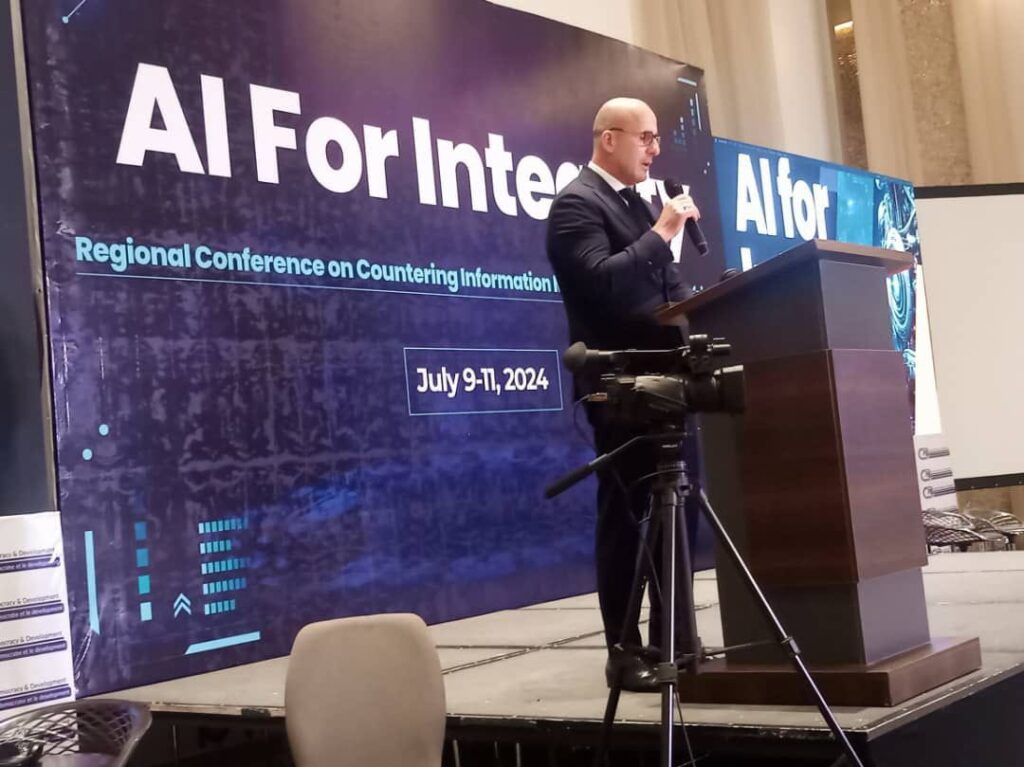In Ikeja, Lagos, a three-day regional conference was held from July 9th to July 11th to address the growing concern of information manipulation in West Africa. Policymakers, journalists, researchers, civil society organizations, and technology experts convened to tackle this pressing issue, particularly in the context of social media and digital platforms. The conference aimed to confront the challenges posed by information manipulation in the region and develop strategies for countering its effects.
The conference provided an in-depth exploration of the use of Artificial Intelligence (AI) as both a conduit for misinformation and a potential tool for mitigating its proliferation. Organized by the National Democratic Institute (NDI) in collaboration with the Centre for Democracy and Development (CDD), the Commission for Canada in Nigeria , and other international partners, the event facilitated a comprehensive discussion on this crucial topic.
The Dual Role of AI in Misinformation
Artificial Intelligence (AI) is a double-edged sword in the realm of misinformation. This implies that on one hand, AI tools can be used as a destructive means of amplifying fake news in the form of content on social media platforms or creating deep-fake images, and visual and audio recordings which spread false narratives and manipulate public opinion. On the other hand, AI can also be deployed as a tool for fact-checking fake narratives to reduce the spread of misinformation. Hence, the term “AI For Integrity” explains the need for AI tools that bring about uprightness from the developers and users of such tools.
In Francophone Africa, a prevalent issue highlighted by Yannich Anaky from Observatoire Ivorien des Driots de l’Homme Côte d’Ivoire is the targeting of women in politics. This case study exemplifies the challenges that women face once they express interest in competing for political and elected positions. Their opponents would get nude pictures, edit the women’s faces onto it, and spread them on all social media resulting in false narratives spread to the public and discouraging them from contesting (Observatoire Ivoirien des Droits de l’Homme (OIDH), 2021).

The public accepted this narrative without confirming that the person in the video is not the President of CENI as the president is a “Man” and the “Woman” in the video is a citizen who was attacked and targeted by an angry mob for allegedly bribing electoral officers in a polling unit.
The conference featured several case studies that stimulated discussions among attendees, highlighting the significance of developing AI-driven solutions to combat misinformation and expanding participants’ perspectives on the matter.
Opportunities for AI in Combating Misinformation
On the second day of the conference, the discussions highlighted several opportunities where AI can play a great role in addressing misinformation. One of those discussions is the Workshop facilitated by Amanda Strydom and Phillip Ayazika on the need to understand AI in countering disinformation. During this session, it was discussed that it is essential for organizations to come up with ethical considerations and or regulations before using AI so as to act as a check for biases and other harmful effects.
Accordingly, Phillip presented A Playbook for Regulating AI which is designed to tackle the problem of data and privacy of the users of AI. Thus, questions such as “Are AI solutions mandatory for users?”, “Does it allow users to control their own data?”, “Is there a significant gap between those who use AI and those who are affected by it?” are questions that agencies that create, and use AI solutions should ask themselves.
Another important session at the conference was the presentation of existing fact-checking civic tech tools termed “Integrity tools” to participants to help combat misinformation. These tools are used to verify information that might have been misconstrued by the public. Tools like Dubawa,Trullyverify, MyAIFactchecker, ChatVE were introduced to the participants and how they function.
Key recommendations from the conference
The Regional Conference on Countering Misinformation in West Africa concluded with a call to action for all stakeholders; governments, technology companies, and civil society organizations across west Africa to collaborate to harness the potential of AI while mitigating its risks. Key recommendations included:
- Ethical consideration from agencies before creating or using AI solutions in their work.
- West African countries should establish regional frameworks for sharing information and best practices in combating misinformation.
- The need for stakeholders to collaborate and create tools that would be generic and factor the marginalized community rather than having several tech tools with the same purpose.
- Tech companies must prioritize the ethical development and deployment of AI tools to ensure transparency and accountability so that AI is used to support, rather than undermine, democratic processes.
- Media literacy programs should be deployed widely to ensure that the users understand how to make use of fact-checking platforms.
- African Languages and their Contextual usage should be factored in AI algorithms to flag off derogatory terms when used.
Conclusion
The 2024 West Africa Regional Conference on Countering Misinformation came to a beaming light as networks among various stakeholders were built which resulted in vast solutions for the combat of misinformation within the region.
Consequently, the conference ended with conversations around the strengths and opportunities of AI for real-time detection of False narratives, automated fact-checking, and predictive analytics intelligence that in turn would guide policy development of media literacy protocols which inevitably would allow stakeholders to collaboratively take great steps towards preventing false information being put out there. It is also important to remember that AI is not a cure-all remedy. It has to work hand in hand with human expertise, ethical considerations, and strong policies to effectively address the evolving challenge of misinformation.
References
Observatoire Ivoirien des Droits de l’Homme (OIDH). (2021, March 8). Cote d’Ivoire
Disinformation Case Study. National Democratic Institute. Retrieved July 24, 2024, from https://www.ndi.org/publications/cote-divoire-disinformation-case-study
Dubawa Fact Check DCI Elections Blog. Retrieved July 24, from.
https://dubawa.org/false-woman-attacked-in-viral-congos-election-video-not-ceni-presiden


